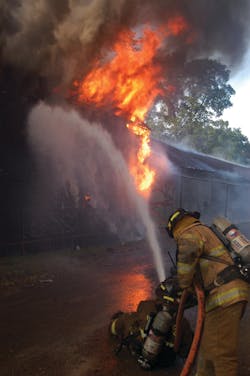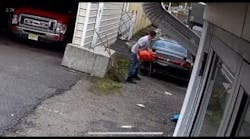“An ounce of prevention is worth a pound of cure.”
Many of you know that Benjamin Franklin coined that phrase. It has become an adage in the fire service, one that I like to use myself when speaking on the issue of prevention and mitigation.
Now, Congress has an opportunity to make Mr. Franklin proud – to do something that has the potential of saving billions of federal dollars and, more importantly, human lives. But it is going to require some pushing and prodding from public safety and other stakeholders to convince Congress to take the required action.
There is a piece of legislation pending in both the House and the Senate titled the Safe Building Code Incentive Act (HR 1878 and S. 924) that would do just that. Succinctly put, the bill offers an incentive to states for adopting and enforcing model building codes. The operative word in this measure is “incentive.” This is not big government forcing its will on states and local communities; instead, this measure creates an incentive for states to adopt model building codes. It does not penalize states, but instead rewards them for good policy. These states would become eligible for an additional 4% in post-disaster Federal Emergency Management Agency (FEMA) grants.
Advocates unite
The Congressional Fire Services Institute (CFSI) is part of an advocacy group called the BuildStrong Coalition that is encouraging Congress to approve the legislation. The CFSI staff has attended numerous meetings with congressional staff on Capitol Hill to discuss the importance of the measure. The BuildStrong Coalition is a broad-based group of associations that represent civil engineers, architects, insurance companies, code organizations and public safety. In meetings with congressional staff, association representatives share their perspectives on the measure, adding important pieces of information to the mosaic of why this legislation can make communities across America safer. For the most part, the staff has been very receptive; however, if there’s one concern that we’ve heard from each staffer, it’s the cost.
According to the Congressional Budget Office, the Safe Building Code Incentive Act would cost the federal government approximately $225 million over five years – certainly not a trifle amount. However, Congress needs to take off its blinders and see how much this legislation can save the federal treasury.
Every dollar spent on mitigation can save the federal government $4 in future benefits. But the climate on Capitol Hill is such that few members are willing to heed Ben Franklin’s words if it costs money. Members of Congress – especially those seeking reelection – are hesitant to lend their name to legislation that might portray them as “big spenders.” Yet on the other hand, most show little hesitancy to vote for supplemental spending measures for major disasters, particularly when it’s their district or state that’s been hit. Don’t get me wrong – I do support emergency supplementals, but I think taking proactive measures to reduce the need for these emergency bills is an even better solution.
If Congress and the Administration want to make our communities safer...if they want to protect their citizens against major disasters…if they want to reduce the annual federal cost each year for recovery efforts following natural disasters…then they should sign their names to the Safe Building Code Incentive Act.
The BuildStrong Coalition has a website (www.buildstrongamerica.com) that contains information about the legislation and reasons why Congress should approve it.
What it takes to pass
Before a measure can see the light of day and be voted on in the House and Senate chambers, it needs to be cleared by the committees of jurisdiction. In this case, the committees are the House Transportation and Infrastructure Committee and Senate Homeland Security Committee. If your members of the House of Representatives or Senate are members of either committee, contact them and ask for their support of the legislation. In your request, describe in your own words why codes are so important to the fire service and the citizens you protect. Let them know that this measure is a wise investment for our federal government, potentially saving taxpayers billions by making communities more resilient and better able to withstand the destructive force of natural disasters.
If lawmakers hear from public safety, then they may not be so reluctant to spend that ounce on prevention because they can say to their colleagues and to their constituents that their support of the Safe Building Code Incentive Act is worth a pound of cure.
Bill Webb
Executive Director
Congressional Fire Services Institute (CFSI)
Washington, DC
The writer has been CFSI executive director since 1995, working with members of Congress and fire service leaders on developing federal legislation and enhancing federal programs designed to improve the readiness of the nation’s fire and emergency services. Before joining CFSI, he worked for the Firefighter Combat Challenge as the project manager for the competition. A former member of the first Bush administration, he served as a special assistant to cabinet secretaries at the U.S. Departments of Education and Labor. Webb is an honorary member of the Vienna, VA, Volunteer Fire Department, Delaware Volunteer Firemen’s Association and International Association of Fire Fighters (IAFF) Local 36. He also serves on the National Fallen Firefighters Foundation Board of Directors. He may be contacted at [email protected].
We welcome feedback, views, reactions and observations. Please send letters to Speak Up, Firehouse Magazine, 3 Huntington Quadrangle, Suite 301N, Melville, NY 11747; fax them to 631-845-2741; or e-mail them to [email protected]. Letters may be edited for space and clarity. The opinions expressed here are solely those of the undersigned and do not represent endorsement by Firehouse® Magazine.






